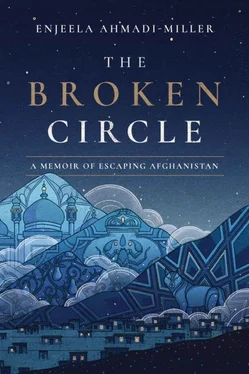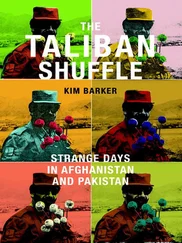“I’ll pay the rent,” Laila said. “If Zia can find some work, we can buy some bread at least.”
“Do you think Salman would put us on the street?” Zia asked.
They all looked at me since I was so friendly with Salman, the kind owner. He’d been sending food to us a couple of times a week lately. Maybe he would let us pay for our extra stay when Padar showed up. I didn’t think Salman would force us to live on the streets, but I had heard him ask other customers to leave the hotel when they could no longer cover the room.
That Saturday, Laila gave Salman the rent. She didn’t tell him that was the last of the money we had. We would have a roof over our heads only until the next weekend.
On Wednesday, we sat on the floor playing cards and talked more about finding work. Zia had gone out into the city each day for a few hours, looking for work. He didn’t appear enthusiastic about his prospects when he returned. I wouldn’t have minded working. At least it would give me something to do all day. Yet I doubted I could find anyone who would hire a little girl. I had no idea how I would go about even finding a job.
“Have you found a job yet?” Zulaikha asked Zia.
“It’s hard—” Zia began to say, but his sentence was interrupted by a knock on the door. We never had visitors, only the room-service staff if they brought us food. But we had eaten hours ago. We all glanced at one another for a good minute, too scared to get up and see who it was.
“Did you tell Salman we don’t have any more money?” Zulaikha asked, staring darts at me, then at Laila.
“I didn’t say anything to him,” Laila said.
“I didn’t say anything,” I said, trying to remember what we had talked about. He was always asking me about what we ate and drank. I did tell him we were very low, almost out of money. But he had never said anything more about it.
“What if he sent that creepy old man up here to kick us out?” Zulaikha said.
“What did you say to him?” Laila hissed at me.
There was another knock at the door. This time it was more urgent.
None of them moved, so I slowly pushed myself up and went to the door. I opened it just a crack and peeked through. It wasn’t Salman. This man had a scraggily beard, longish hair, and dusty peran tumban. He looked like he’d just walked a thousand miles across the mountains and deserts of Afghanistan. His face under that thick beard appeared vaguely familiar. He smiled at me and held out his hands in a warm greeting. Then I knew. I swung the door wide open for all of them to see.
“Look!” I said, then my throat was choked by a sob. Standing in the doorway of our room was Padar.
Though Padar stood in the doorway a few feet from me, I dared not touch him, fearing his image would fade and evaporate like a mirage. I had wished nearly every moment since we had arrived at this hotel that he would appear just like this. Behind me, my sisters and Zia were silent, so maybe I was dreaming. A cruel trick of my overwrought imagination.
He knelt on one knee so we were eye to eye. “Enjeela, it’s me.” His familiar voice was warm and comforting. Even from behind his shaggy beard, his smile was unmistakable. He wrapped his arms around me in a warm hug. Flesh and bone. I held on to him so tight I could have choked him. Once I had embraced him, Zia and Zulaikha and Laila all ran to him, each hugging and shouting in exultation and relief. We were all crying, and he let us mob him as he worked his way into the room.
“I told you he would come for us!” I shouted over the din of the tearful reunion. We were all so glad and truly surprised; he arrived just as he had promised.
After we had finished jumping around, shaking off all of the anxiety and fear of the moment before I opened the door, he sat on the edge of one of the beds and looked us over, appraising each of us. “I am so sorry it took so long to get here. What have you been eating?” he asked.
Laila showed him the dried bread crusts and empty milk bottle.
He took the milk bottle from her hand, and he reached out to her with the other. “Children, children!” His voice was sad, and we all ran to him. He gave each of us a brief hug; I could see that he wanted to linger over us, but he could not allow himself to show too much emotion. It just was not his custom, even though I could see he felt deeply about our condition. “You must be hungry.”
“Yes!” we all shouted. Hungry. I had lived so long with a gnawing pain in my stomach, it had begun to feel normal. None of us even complained anymore about how little we ate. Bits of food had become extravagances, so the thought of eating a full meal again made us all excited.
“Where do you want to go?”
We all shouted different places—everyone had their own ideas of a celebration. But my voice rang out above the others: “There’s a restaurant next door that smells really good.”
He clapped his hands, then started for the door. “Let’s go!”
The five of us ran downstairs, laughing and still crying. In the lobby I saw Salman. I ran over to tell him that Padar had arrived. He nodded at me with a smile, reminding me that he’d been telling me all along that my father wouldn’t leave me behind. His smile seemed to take on a sad tinge even as he congratulated me on the happy news. Now that Padar had arrived, it meant that we would be leaving soon.
At the restaurant, my dad ordered every type of rice they had—green, red, yellow, white—a feast of color and flavors. He told the waiter to fill the table with food. I had never felt so full in my life. When we went back to the hotel, I curled up in one of the beds next to Padar. A comfortable feeling came over me that we were together again, and finally at peace.
I stayed at my father’s side all that week as he made the arrangements for the next leg of our trip—he told us that we would be moving on to Islamabad, where we would visit a friend he had worked with at the American embassy in Kabul. I thought this would be another long journey, but Laila showed me on a map that Islamabad was a day’s ride east by car from Peshawar.
Padar took us shopping for new clothes to get ready for our journey. One night that week, at dinner in a restaurant by our hotel, Laila asked him why we had to go to Islamabad.
“Can’t we just get on an airplane and fly to India, where Mommy is?”
He ate slowly as if considering his words. He had trimmed his beard and purchased some new clothes but still wore the traditional shalwar kameez like so many did in Peshawar. He looked refreshed, with his black hair neatly trimmed, much like his old self.
“We can’t leave Pakistan just yet.”
“Why not?” Zia asked.
“We left Afghanistan without passports or the proper paperwork and identification to get passports. No other country will let us enter without them.”
“Pakistan let us in,” I said, thinking I could clarify the issue of simply walking across the border past a few guards.
“Yes,” Padar said, “they let all of us in with refugee status.” He went on to explain how as refugees, we had no legal status, so we couldn’t work and had none of the rights of citizens. We had no rights to travel to any other country, and the Pakistani government could force us back into Afghanistan anytime it wanted.
“They won’t do that, will they?” Zulaikha said.
“It’s not likely,” he said. “But with so many Afghan refugees flooding the country, anything can happen. We have to get passports to travel to India so we can join your mother.” He explained that he had wanted us to carry our birth certificates with us in our backpacks, but Masood had warned him not to do that. If we’d been searched by soldiers, it could have gotten us in a lot of trouble, even killed. He had wanted to mail the birth certificates to India, but since the Soviets had been watching everything he did, particularly what he mailed, it was too risky. Before he left, the Russians had been accusing him of trying to spy for the Americans. They had been watching him constantly.
Читать дальше












